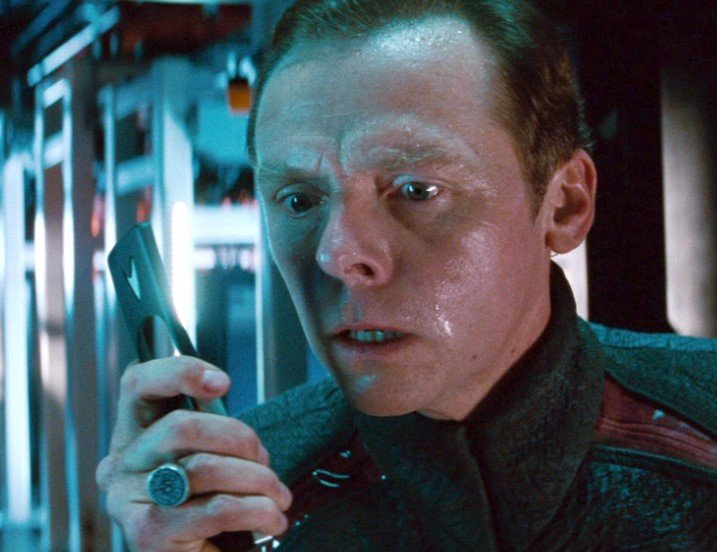Actor warns against Hollywood’s obsession with darkness as the franchise floats in limbo
Simon Pegg has seen where Star Trek goes when it tries to be “dark” — and frankly, he’s had enough. The actor and screenwriter, best known for playing Scotty in the rebooted Kelvin timeline, wants the next Star Trek film to skip the grit and go back to its curious, thoughtful roots.
His comments come as the franchise teeters on the edge of creative uncertainty. While Paramount+ churns out more Trek television than ever, the film side remains stuck in development hell. And fans? They’re divided. Some crave the spectacle. Others — like Pegg — miss the soul.
Pegg’s Plea: Less Violence, More Imagination
In a recent Variety interview, Pegg didn’t hold back. He called out what he sees as a tired Hollywood trend: the belief that making something “gritty” automatically makes it more adult.
“The original Star Trek wasn’t childish,” he said. “It was actually quite sophisticated.”
He’s right — and frustrated. Modern reboots across pop culture have leaned heavily into violence and cynicism. Think Batman. Think Bond. Think even Harry Potter, where each sequel got darker than the last.
But Star Trek, Pegg argues, shouldn’t follow that path. The show has always been more about ideas than explosions.

The Grit Trap That Sucked In Star Trek
If you watched the first two J.J. Abrams Star Trek films, you probably remember the lens flares, the explosions, the snarling villains with tragic backstories. In “Into Darkness” (2013), whole cities collapsed. Entire starships fell out of the sky. And philosophical debates? Almost nowhere to be found.
That era rode the wave of the “gritty reboot” boom that began in the mid-2000s.
-
2005’s Batman Begins made Bruce Wayne more brooding than ever
-
Casino Royale in 2006 ditched gadgets for bruises and blood
-
Even King Arthur got a somber, muddy makeover in 2004
Star Trek, despite its optimism-first DNA, didn’t escape the trend. Abrams’ 2009 reboot cranked up the violence and dialed down the wonder. Pegg believes that may have missed the point.
A Fan-Turned-Writer Who Knows the Franchise
What gives Pegg’s take weight is that he isn’t just another actor promoting nostalgia. He co-wrote Star Trek Beyond in 2016 — the last theatrical Trek film to hit cinemas.
“Beyond” tried to restore balance. It wasn’t perfect, but it felt lighter, closer to the spirit of the classic series. Still, the film underperformed at the box office, and that was that. The Kelvin timeline has remained dormant ever since.
But Pegg’s fandom runs deep. He’s not asking for nostalgia for its own sake. He wants stories that feel like Star Trek — which, he says, means thoughtful plots, moral questions, and genuine wonder about the universe.
And he’s tired of revenge-driven villains.
Where Things Stand for Star Trek Films Now
Paramount insists there’s another movie coming. They’ve said it for years. But nothing’s materialized. As of mid-2025, there are multiple Trek film projects technically “in development.” None have a release date. None are on the official production slate.
Meanwhile, television keeps chugging along.
Here’s the current state of Star Trek projects across media:
| Title | Format | Status | Notable Cast |
|---|---|---|---|
| Star Trek: Section 31 | Film (Paramount+) | Released Jan 2025 | Michelle Yeoh |
| Star Trek: Strange New Worlds | TV Series | Season 3 airs July 2025 | Anson Mount, Ethan Peck |
| Starfleet Academy | TV Series | In production for 2026 | TBA |
| Kelvin Timeline Film #4 | Theatrical Film | In development, no date | Possibly Chris Pine |
Pegg’s comments land at an interesting time. The studio’s priorities seem to be shifting toward streaming, where Trek has found new life — but also new tone problems.
Is Trek Losing Its Moral Compass?
If you’ve watched Star Trek: Discovery or Picard, you might’ve noticed the tone shift. Characters swear. Death is common. Pacing is faster. Conflict is more visceral.
But the slower, idea-driven storytelling? Often lost.
Pegg’s warning is less about nostalgia and more about tone. He’s not against action. He just doesn’t think violence equals maturity. Star Trek, after all, was never meant to be cynical. Its most powerful episodes asked ethical questions that still hit hard today.
That’s what he wants to see more of.
“Science fiction doesn’t have to be full of death and swearing and questionable morals to be consumed by adults,” he said.
What Fans Are Saying — And What They Really Want
Online, Trek fans are split, but many echo Pegg’s view. Some crave stories like The Measure of a Man or City on the Edge of Forever — episodes from the classic series and The Next Generation that balanced drama with hope.
There’s no shortage of desire. The problem is, the studios seem unsure of what kind of Trek to deliver.
Some voices in fandom want:
-
Less shootouts, more diplomacy
-
Smarter dialogue, fewer brawls
-
A return to exploration, not endless war
That last point especially stings. Trek used to be about the future we could have. Lately, it feels more like the future we fear.
Pegg’s Last Word — And The Road Ahead
“So if we did another one,” Pegg said, “it’ll be interesting to see what we do next.”
That’s the thing. No one knows. Paramount has been cagey. Scripts have been shelved. Directors have come and gone. The cast is aging out of their rebooted roles. And fans? They’ve learned to stop holding their breath.
Still, the core of what Star Trek means — curiosity, morality, discovery — hasn’t changed. Pegg is just one of many who hopes the films find their way back to it.
Because if Trek is going to boldly go somewhere new, it might help to remember where it came from.








